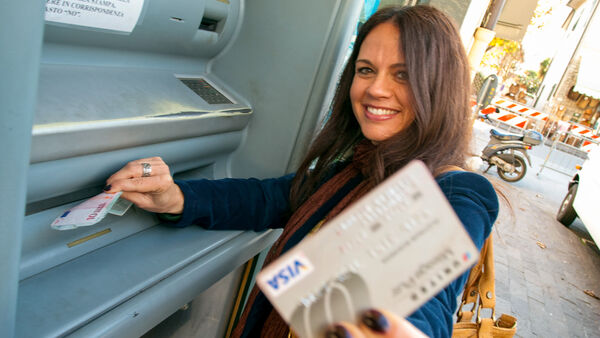Bank Card Safety Tips for Travelers
By Rick Steves
While you're not at any more risk for bank fraud when on the road than at home, the potential hassle involved is much greater. Here are some tips for protecting your debit and credit cards on the road.
Be vigilant: Pickpockets target tourists. Keep your cash, credit cards, and passport secure in your money belt, and carry only a day's spending money in your front pocket or wallet.
Safeguard your PIN code(s). Memorize your credit card and debit card PINs; you'd be surprised how many people foolishly write these on their cards. "Shoulder surfing" — a thief watching you as you type your PIN into a keypad — is worth being aware of. When entering your PIN, carefully block other people's view of the keypad.
Be a savvy ATM user. Pay attention to strangers loitering near a cash machine, especially if they're in pairs (a common tactic is for one person to distract you while the other grabs your cash). You're most vulnerable just after you have entered your PIN and the withdrawal amount. Thieves employ many clever ruses to distract ATM users. A scammer may pretend to sell you a newspaper, place a €5 bill at your feet and tell you that you dropped some money, or ask you for a charitable donation. Sometimes the scammers are children.
Inspect ATMs for card skimmers and traps. Before inserting your card into an ATM, inspect the front of the machine (especially if it's not inside a bank). If anything looks crooked, loose, or damaged, it could be a sign of a card-skimming device.
Also keep an eye out for anything in the card slot that could trap your card (or in the cash dispenser that could trap the cash). Thieves have been known to insert a thin loop of tape cleverly designed to trap your card in the slot, then promptly arrive on the scene posing as a good Samaritan. They'll either tell you that you can retrieve your card by retyping your PIN, or point to a sign recommending that you enter your PIN twice if there's trouble. Either way, someone is nearby watching you enter your code. Once you give up on getting your card to eject and leave the scene, the criminals collect it and use it.
If your card or cash does get stuck, try to avoid leaving the machine. If you're traveling with a partner, have one person go inside the bank while the other one stands by the machine — if your card or cash has indeed been trapped, the thieves won't wait long to retrieve it.
Keep tabs on your cards. Whether using an ATM or paying a restaurant bill, keep track of your card. It's easy to get distracted as you gather your cash from the ATM dispenser or finish a drink after paying your bar tab. Many ATMs will suck your card back in —and keep it — if you fail to retrieve it promptly (another good reason to use ATMs at banks).
Avoid using a debit card for purchases. Because a debit card pulls funds directly from your bank account, potential charges incurred by a thief will stay on your account while your bank investigates. For that reason, I limit my debit card use to cash-machine withdrawals. To make purchases, I pay with a credit card or cash.
Bring just a few cards and monitor your balances. Clean out your wallet and take only the cards that you expect to use, plus a backup. (You don’t need that JC Penney card in Croatia.) You can monitor your balances as you travel by using online or mobile banking; be sure to use a secure connection to when accessing a financial account online.


